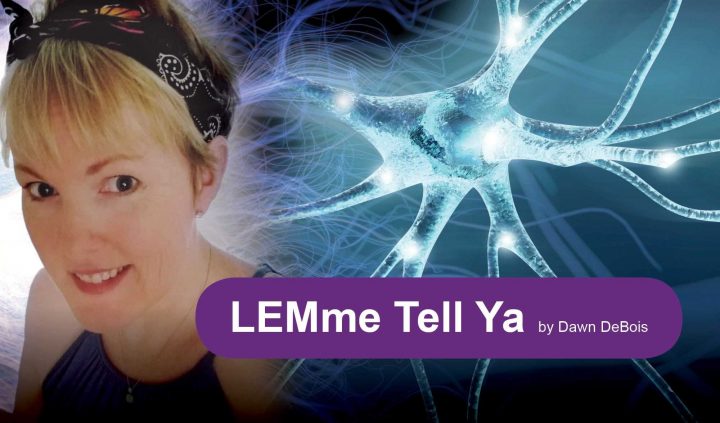I’m Fortunate to Be the ‘Right Talent, Right Now’
Written by |

Did you know that October is “National Disability Employment Awareness Month“? I hadn’t realized it until midmonth, though I’m legally disabled and employed as a writer.
This year’s theme, “The Right Talent, Right Now,” jumped out at me as thoughts swirled in my head about having a month dedicated to the dual identities of being disabled and employed.
For those like me, whose body went into attack mode and stopped me in my tracks midlife and midcareer, using the word “disabled” to describe myself was incredibly hard.
Five years before I stopped working and filed for Social Security Disability Insurance (SSDI), my primary care provider advised me to start preparing for when I would be unable to work. The pain I endured while trying to maintain a full-time work schedule was obvious to everyone. My vacation time turned into sick days. Work attendance became an issue because my body couldn’t handle the stress of my position and exposure to germs in the workplace.
However, I needed health insurance, so I persisted. I changed positions to less stressful roles until, eventually, my body imploded.
When I tearfully relented and resigned from my last full-time position, one of my friends said that I behaved as if it were the worst thing in the world. My response was, “But it is.” To say that I was devastated that I could no longer work is an understatement.
Just because our bodies have betrayed us, it doesn’t mean that people with disabilities have no talents to contribute to society and the workplace. We don’t want to stop working. We were literally forced to stop.
I was approved for SSDI six months after my resignation — the longest period of my life. I’ve always had a plan B, C, and D. But during those months, I lived in survival mode without a backup arrangement.
Having worked my entire adult life, I knew that I would lose my mind if I didn’t have anything productive to do. So, combining my public health education and pharma experience, I started my blog, “The Battle Within.” This project soon led to my becoming a contributor to The Mighty. Neither of these ventures added any income to my monthly disability allowance. However, writing added heaps of satisfaction that I was giving something valuable to those suffering from the same invisible illnesses that I had.
Anyone who is on SSDI will tell you that the income doesn’t go very far, especially if you are single. When my doctor told me to prepare, I heeded her advice. I downsized my home, reduced my outgoings, and worked out a budget. Thankfully, I wasn’t financially blindsided by becoming disabled. However, learning to live on a monthly payment is extremely humbling after being a professional with a college degree. Dinner and networking with friends a few times a week turned into possibly going out once every couple of months. Distinguishing between “wants” and “needs” became essential. Vacations away are now a distant memory.
SSDI does allow for part-time employment within specific income guidelines. I dabbled a little working in a couple of different situations that weren’t a good fit for me, either because of my intravenous immunoglobulin infusion schedule or brain fog hitting when my employer’s needs were greatest. However, the additional income meant that I could splurge on getting my hair done or buying a new outfit. Having a few extra dollars in my budget to spend on nonessentials is essential to my self-esteem.
When I was approached about writing this column, I was told I could choose a schedule to suit me. If I missed a deadline for health reasons or to receive treatments, that was fine. One week when I had to skip my column because of severe brain fog, it was a nonissue. But I was typically tough on myself about it.
When I started blogging, I had no idea that my talent would lead to my own column and allow me to add some income to my SSDI. I derive considerable satisfaction in knowing that I’m making a difference for a large readership affected by my rare disease. Being supported by editors who are taking my writing to an entirely new level is far beyond anything I imagined possible when I started my blog.
Now, when someone asks what I do, I don’t reply, “I’m disabled.” I say, “I’m a writer.”
I’m so incredibly fortunate to be the right talent, right now.
You, too, can be the same.
***
Note: Lambert-Eaton News is strictly a news and information website about the disease. It does not provide medical advice, diagnosis, or treatment. This content is not intended to be a substitute for professional medical advice, diagnosis, or treatment. Always seek the advice of your physician or other qualified health provider with any questions you may have regarding a medical condition. Never disregard professional medical advice or delay in seeking it because of something you have read on this website. The opinions expressed in this column are not those of Lambert-Eaton News or its parent company, Bionews Services, and are intended to spark discussion about issues pertaining to Lambert-Eaton myasthenia.





Jerry Hirsch
Thanks for your input, as many of your readers share the same issues, and relate to your journey with LEMS on a personal level.
Dawn DeBois
Jerry, thank you for your comments, always. Dawn